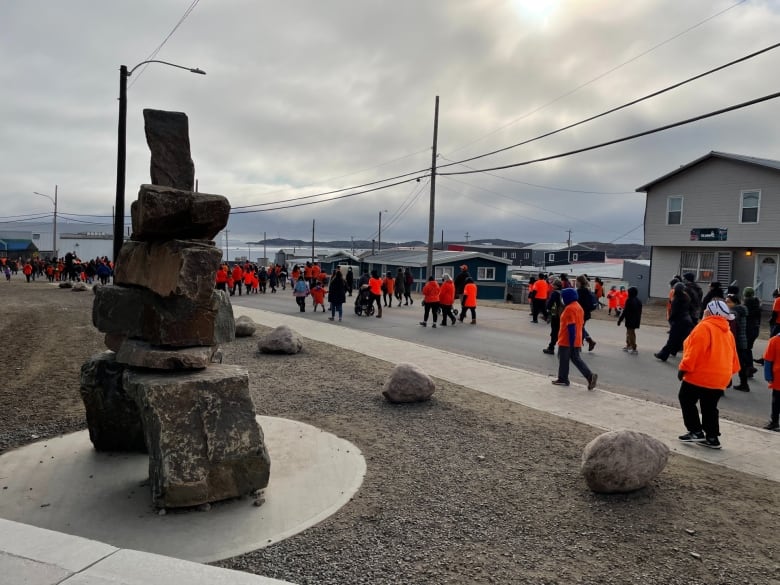Jack Anawak, a residential school survivor and Nunavut politician, led a procession of about 1,000 people in Iqaluit Thursday, carrying an orange and white flag with an “all children matter” banner, in memory of any children who died at residential schools.
About a thousand Iqaluit residents, nearly all in bright orange T-shirts or hoodies, walked down the main street of Nunavut’s capital on Thursday for National Day for Truth and Reconciliation.
Leading the march was Jack Anawak, carrying an orange and white flag with an “all children matter” banner in memory of any children who died at residential schools.
This display was a proud gesture from a man who survived years in residential school and has been among the forefront of those fighting since the early 1990s to have their traumatic experience recognized. But rather than focusing on reconciliation, he said Inuit need to decolonize and rise up.
“I think we have to assert our rights that were always there. We’ve fallen under colonialism. We went through a period where we were basically in a cage,” Anawak said.
“We were not allowed to talk Inuktitut. They tried to do away with our culture. They tried to do away with our language. Without a process of being conquered we just got taken over … we just have to say enough is enough.”
Anawak was born in Naujaat, Nunavut. When he was eight years old, he was taken hundreds of kilometres away to the Sir Joseph Bernier residential school in Chesterfield Inlet, Nunavut, on Hudson Bay’s western coast.
There, Anawak said he witnessed his classmates being beaten with the sharp end of a long ruler and pushed into a corner to wear a dunce hat.
These were among the stories Anawak told Inuit leaders meeting in Iqaluit Thursday for the annual general meeting of Inuit Tapiriit Kanatami (ITK), the national organization for Inuit.
Anawak, now 71, has a long history as a political leader among Inuit, and has served as an MP, MLA and circumpolar affairs ambassador. He has also gone public with his battle with addictions.
His message to those at the ITK meeting: if we are going to reconcile and heal, we have to think in our own cultural ways about how to proceed.
‘We are still Inuit’
Pita Aatami, who heads Makivik Corp, the organization that represents 11,000 Inuit in northern Quebec, responded to Anawak at the meeting.
“If we are going to reconcile with the government, they have to recognize that we are running our own affairs,” Aatami said.
ITK President Natan Obed, who agreed with Anawak’s point about decolonization, said ITK continues to work toward that goal in education, health and other areas.

Aluki Kotierk, president of Nunavut Tunngavik Inc., the Inuit organization that represents 30,000 Nunavut Inuit, later spoke to those gathered in Iqaluit before the march. She said it was a heavy day, full of thoughts about many little children who never returned home.
Everyone present observed a moment of silence before the march began.
At the end of the march in Iqaluit Square, Kotierk helped distribute packages of frozen caribou. She called the food distribution a marker that “we are still here.”
“We are still proud,” she said. “We still love our food and we are still Inuit.”

